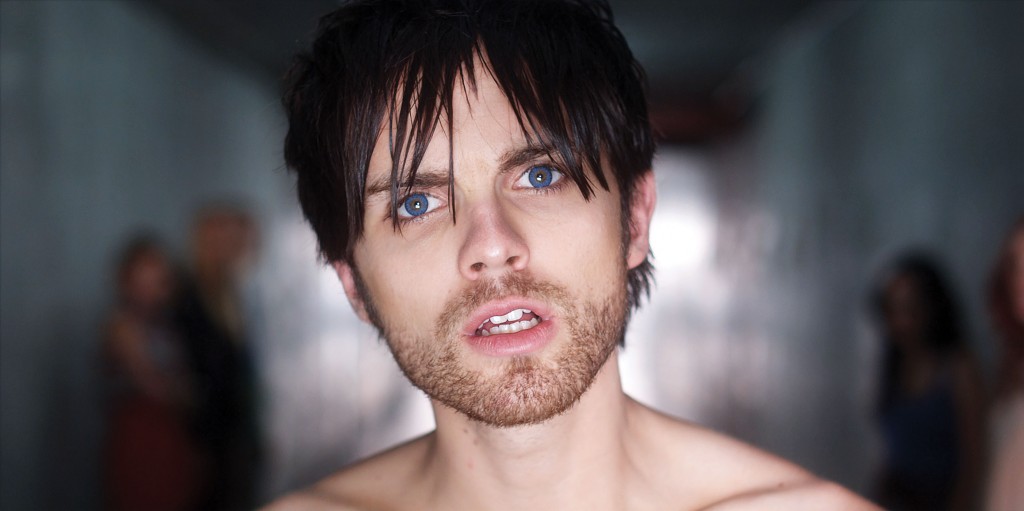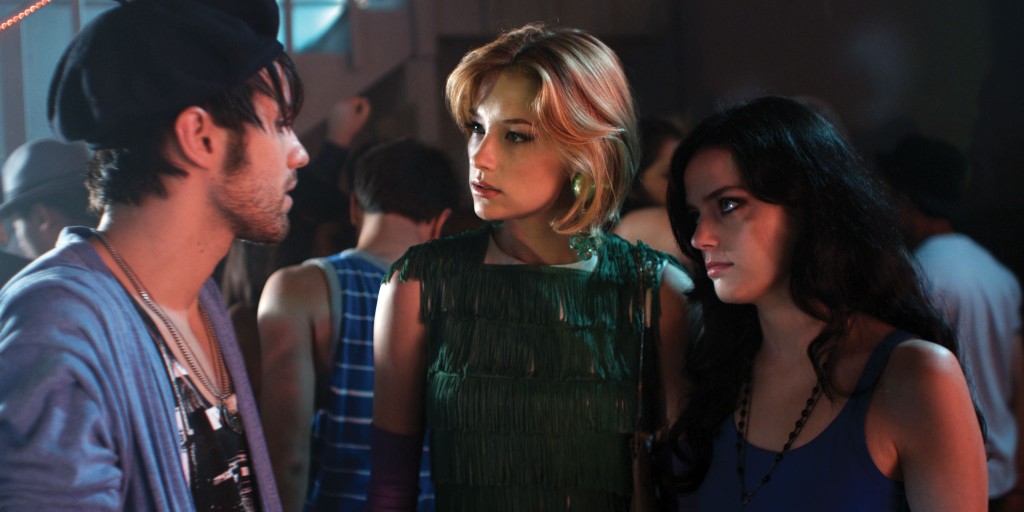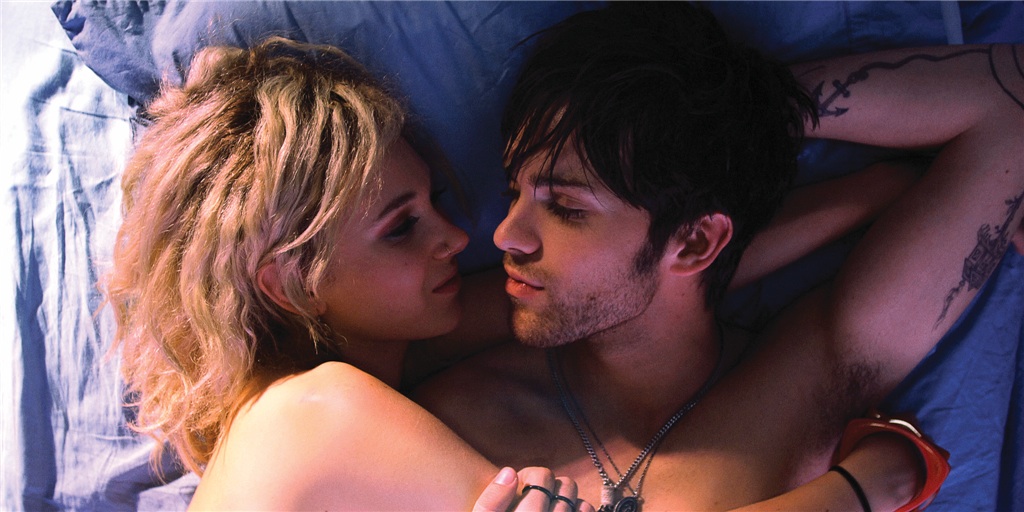Thu 27 Jan 2011
Apocalypse, Like, Now?
Posted by Ethan under Film Review, NYC Film Critic
Comments Off on Apocalypse, Like, Now?
Kaboom
Written and Directed by Gregg Araki
Starring Thomas Dekker, Haley Bennett, Juno Temple, Chris Zylka
***1/2
I came to writer/director Gregg Araki’s work relatively late in his career. This wasn’t a deliberate choice, mind you. I was living overseas when his first three features—The Living End, Totally F***ed Up and The Doom Generation—become cult favorites in the early ‘90s and while those films were successful on the indie circuit stateside, there wasn’t much demand for them internationally. I had returned to American soil by the time he released Nowhere and Splendor in 1997 and 1999 but neither film registered on my radar, perhaps because they were granted the most limited of theatrical releases.
Instead, my first Araki joint was 2005’s Mysterious Skin, a searing drama about the effects of child abuse that landed on my Top Ten list for that year and instantly turned Joseph Gordon-Levitt—who at that time was best known as one of the stars of the sitcom 3rd Rock From the Sun—into a major dramatic talent. Two years later, I howled with laughter while watching his marvelous stoner picture Smiley Face, which remains the best vehicle that Anna Faris has ever lent her considerable comic talents to. It was at that point that I finally started getting caught up on Araki’s back catalogue only to discover that I didn’t like his early films all that much. Compared to the controlled tension of Mysterious Skin or the goofy charm of Smiley Face, a movie like The Doom Generation came across as sloppy and mean-spirited, the work of a filmmaker that valued shock and awe over coherence and craft. So perhaps it was for the best that I missed those movies the first time around; if those were my initial exposure to Araki, I may not have made a point to seek out Mysterious Skin and Smiley Face.
Given my experience with his earlier filmography, when I read in the press notes for Araki’s latest film Kaboom that he set out to make a movie more in the vein of his ‘90s output, I have to admit that my heart sank somewhat. Fortunately, the finished product is far more polished and enjoyable than his initial description led me to believe. And when I spoke with Araki for a story I wrote for The Brooklyn Paper, he further clarified that he wanted Kaboom to feel as creatively free as his early films, but possess the same artistic maturity that’s evident in his most recent work. On first glance, “mature†would seem to be an odd word to describe Kaboom, a film that speeds through a dizzying array of silly plotlines in its 86 rambunctious minutes. Set at a picturesque California college (modeled after Araki’s own alma matter, UC Santa Barbara) the film revolves around a bi-curious undergad film student named Smith (played by Thomas Dekker, late of The Sarah Connor Chronicles) who lusts after his hunky surfer roommate Thor (Chris Zylka), while also engaging in impressive sexual gymnastics with comely co-ed London (Juno Temple). Meanwhile, Smith’s lesbian best friend Stella (Haley Bennet) embarks on an ill-advised romance with a possessive, but super-hot witch (Roxanne Mesquida) and London introduces Thor’s lunk-headed beefcake pal Rex (Andy Fischer-Price) to the joys of three-ways. Oh and with all this sex going on, I somehow forgot to mention Smith’s bizarre dreams or the animal-mask wearing, apocalypse-predicting members of a bizarre underground cult that start stalking him for mysterious reasons.
As I said, none of this sounds particularly mature, but underneath Kaboom’s manic energy is a thoughtful and even relatable story about one teenager’s attempts to adjust to the various freedoms that come with college life. Certainly, Araki’s joyous and non-judgmental presentation of sex and the fluidity of sexual identity is rather remarkable for an American film. Most movies that attempt to tackle this subject matter—be they mainstream or indie productions—insist on strictly classifying its characters as gay or straight and tend to focus more on depicting the consequences of sex rather than the pleasures of the act itself. The young people in Kaboom not only enjoy guilt-free lovemaking, but they also don’t get too hung up on who they’re “allowed†to be attracted to. (The only American movie in recent memory that carries the same smiley-faced “Up with sex!†vibe as Kaboom is John Cameron Mitchell’s underappreciated 2006 comedy Shortbus.) Always a strong director of young actors, Araki coaxes relaxed, funny and uninhibited performances out of the entire ensemble. They’re just as charming and enthusiastic as the kids on Glee, but take themselves a hell of a lot less seriously.
One way that Kaboom most strongly resembles Araki’s early work is in its disinterest in weaving the various narrative threads together for a coherent, conventional payoff. In fact, some moviegoers may take the film’s final shot as a middle finger in the face as opposed to the punchline of a feature-length joke as it has clearly been intended. Araki has cited Twin Peaks as a major influence on the movie and that’s apparent in his liberal use of wild plot twists—whether they make sense or not—and affection for the eccentric. (It’s worth noting that many folks were turned off by that show’s various digressions and unresolved story points as well.) Again though, Kaboom’s general good humor makes its quirks appealing rather than off-putting. If this is what the new, mature Araki looks like, I’m all for it.
Kaboom opens in limited release on Friday and will also be available via IFC’s Video On Demand service.




No Responses to “ Apocalypse, Like, Now? ”
Sorry, comments for this entry are closed at this time.